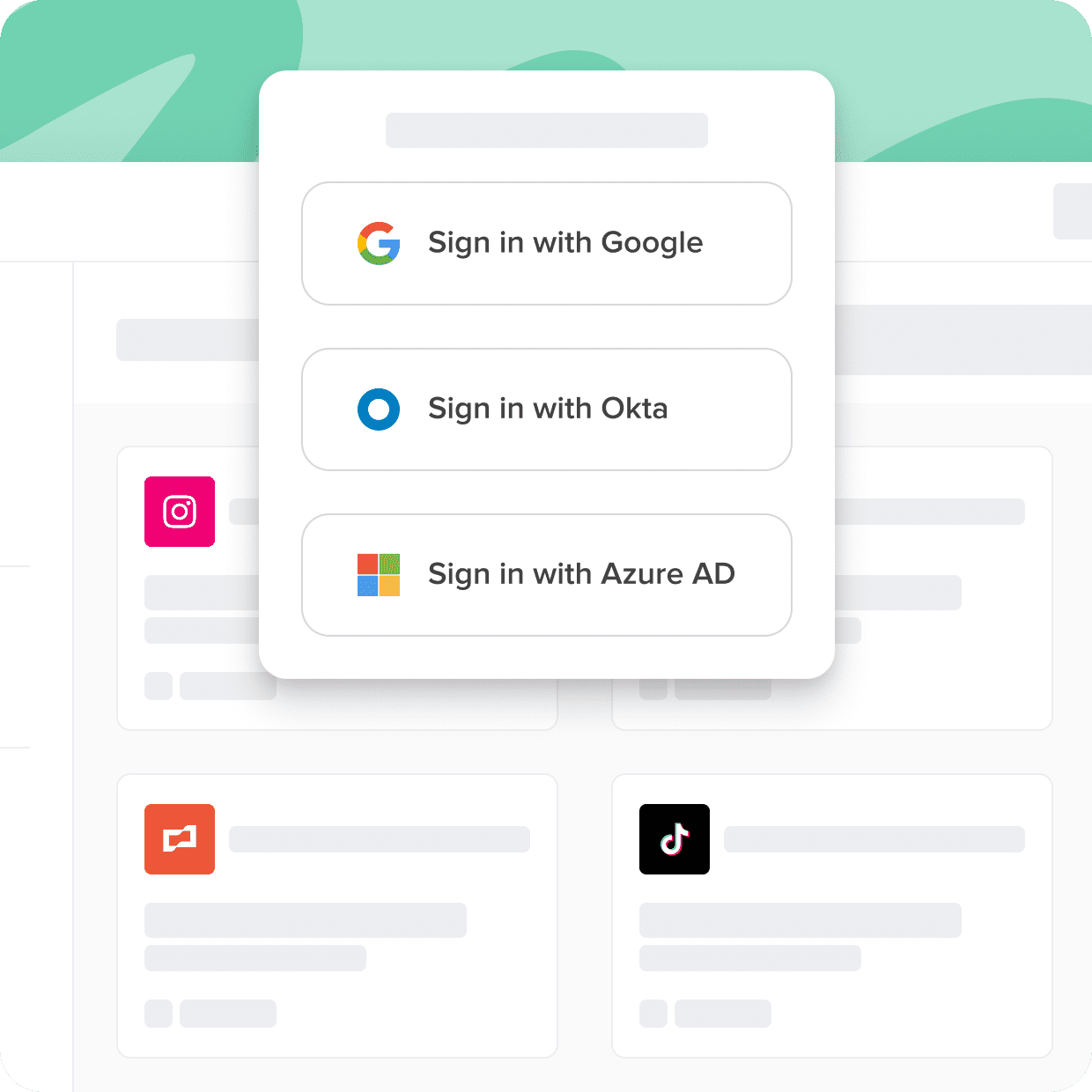Single sign-on (SSO) is a fantastic technology allowing businesses to eliminate password reuse and simplify the login process. Unfortunately, many corporate applications don't support the SSO standard and can't reap all the benefits. The applications that fall into this category are best called "nonfederated." Nonfederated applications are a new category that is becoming increasingly challenging for businesses to manage and secure effectively, yet increasingly critical for businesses to succeed.
Cerby connects all of your apps to your SSO tools, even if they don't support the SSO standard. In this guide, you'll learn about different SSO tools, the challenges, and the players.
Streamline Access With Single Sign-On
Not all apps are created equal. Some come with security gaps and complexities that can hinder user adoption and put sensitive data at risk. With Cerby, you can ensure secure and seamless access to all your applications, regardless of their support for standards like SSO.
With Cerby You Can

Close the identity gap

Universally enforce 2FA

Eliminate the SSO tax
The World Of SSO
In today’s fast-paced world of app development, SSO tools have become integral components in the process thanks to their ability to simplify and streamline login protocols and generally improve user experiences. SSO solutions also empower users to access multiple applications with a single set of credentials, which virtually eliminates the need to remember and enter separate usernames and passwords for each individual application. This results in time saved for users and simultaneously significantly reduces the risk of password-related security breaches. The challenge, however, is that many applications don’t support the necessary security standards to work with SSO—namely, the security assertion markup language (SAML). Nonfederated applications are a serious security risk, and research from the Ponemon Institute found that they make up a statistically significant percentage of breaches.
There are a number of single sign-on providers in the market, including both commercial and open-source SSO solutions. Commercial providers like Okta and Auth0 offer comprehensive solutions that broadly cater to the needs of larger enterprises and provide features like multi-factor authentication, access control, and user provisioning. These features may come with a premium price tag, but for larger organizations with serious security requirements – the expense is well worth it.
Alternatively, there are also numerous open-source SSO solutions like Keycloak, which can be a great, cost-effective option for smaller organizations or businesses with limited budgetary resources. Keycloak is a widely-utilized open-source identity and access management solution with helpful SSO capabilities, user federation, social login, and more. Organizations can integrate Keycloak relatively easily into various platforms and technologies, which makes it one of the most versatile solutions for many different case uses.
In addition to improving user experience, a single sign-on tool can provide dozens of benefits for application developers. By effectively leveraging SSO solutions, app developers can greatly reduce the time and effort necessary to implement authentication and authorization functionality in their applications. This means developers can spend more time working on fine-tuning core features of the app, and allows whole teams to improve productivity and reduce the time to market. And as the prevalence of single sign-on tools continues to grow, more organizations will likely adopt these solutions to help improve their security measures and user experiences.
What Is SSO?
We’ve already touched on some uses of SSO, but what is SSO exactly? And how can businesses effectively integrate SSO solutions into their operations? Single sign-on login technology enables users to access different applications with a single set of login credentials. It also eliminates the need for users to remember and enter separate usernames and passwords for each individual application, which simplifies the authentication process and drastically improves user experiences.
SSO tools are able to work by establishing a trust relationship between the user’s primary browser and the SSO identity provider. Once the user has been successfully authenticated by the SSO identity provider, the user can then easily access any application that is configured to trust the SSO identity provider – without having to provide alternative or additional login credentials.
Because of these functionalities, SSO is commonly utilized in enterprise environments where users must have access to multiple applications across many different systems such as email, CRM, and HR systems, among others. SSO is also commonly utilized in consumer-facing applications like social media sites and online shopping platforms – to provide customers with a more convenient and seamless user experience.
Some of the best SSO providers on the market include platforms like Okta, Microsoft Azure AD, Ping Identity, Auth0, and more. These providers offer numerous features and benefits like multi-factor authentication, user provisioning, and access control, which makes them suitable for companies of all sizes from all different types of industries.
In addition to some of the more common commercial SSO providers, there are also many open-source SSO tools available like Keycloak and/or Gluu. These open-source tools are a helpful and cost-effective alternative for smaller organizations that may lack the budget or resources to implement more comprehensive SSO solutions. By and large, single sign-on is a valuable piece of technology that helps businesses improve user experiences and security measures simultaneously.
SSO providers list
There are countless SSO tools and providers from which to choose, ranging from commercial solutions to open-sourced tools. To help provide a better sense of what’s available and how businesses can choose the option that works best for their unique needs, we’ll provide a basic list of some of the most popular SSO providers and ways to evaluate whether or not a provider would be a good fit for your organization:
- Okta
- Microsoft Azure AD
- Auth0
- Ping Identity
- Google Cloud Identity
- OneLogin
And when evaluating this SSO providers list, or any SSO provider, businesses would be wise to consider the following:
- Security – As more businesses seek to improve their workflows and ability to engage with customers on a digital level, the importance of cybersecurity must be a primary consideration. Look for an SSO solution that can provide multi-factor authentication and encryption to ensure that user identities and sensitive data are protected.
- Expense – While implementing an SSO solution can be a valuable investment for many organizations, business leaders must consider how much value is being provided compared to other comparable budgetary expenses.
- Ease of use – SSO solutions must also be user-friendly and relatively simple to deploy and maintain (with minimal technical proficiency required). The less time a business spends handling the fine-tuning and details of an SSO solution, the more time it can spend providing customers with greater experiences and services.
- Integration – For larger enterprises or businesses with numerous other platforms, integration is key. An SSO solution must be able to integrate with existing platforms and technologies, including cloud-based applications, on-premise systems, and mobile devices.
- Scalability – Whether your organization is a sprawling, international enterprise, or a humble, locally-owned, and operated business venture, your SSO solution ought to be able to adequately handle the needs of your organization.
While shopping for or making an SSO solutions comparison, business leaders must take a close look at each provider’s features, pricing, and customer support to ensure that they’re getting the best possible deal and a solution that adequately addresses the needs of the organization.
Single Sign-On Example
Selecting the appropriate single sign-on provider is critical for businesses regardless of their size or budget, as single sign-on solutions can significantly impact user experience levels, overall security, and productivity. In this section, we’ll cover some different examples of how various businesses can benefit from SSO solutions:
- Small businesses – While they may not have the resources to manage multiple user accounts and passwords, that’s what makes SSO solutions such a valuable option for small business organizations. For instance, a small business that utilizes cloud-based applications like G Suite, Salesforce, and/or QuickBooks could implement a single sign-on portal to simplify the authentication process to improve employee productivity. A single sign-on example (Java-based) might involve OAuth2, a helpful protocol tool that enables secure authentication and authorization for both web and mobile applications.
- Healthcare companies – Dealing with sensitive patient information on a daily basis practically necessitates the implementation of a robust SSO solution. In order to comply with strict government and industry regulations (like HIPAA), healthcare companies can utilize an SSO provider to enable two-factor authentication and access control policies to ensure that only authorized users have access to patient data and other sensitive information.
- Financial institutions – Because they deal with sensitive information and high-value transactions, financial institutions are also under a lot of pressure to provide formidable security measures to prevent fraud and unauthorized access to sensitive data. SSO solutions can provide robust single sign-on authentication and access control capabilities to ensure that only authorized users have access to their financial data.
Different businesses have different needs, and this is true when it comes to SSO solutions as well. Business leaders must evaluate SSO providers based on their security features, scalability, ease of use, and cost-effectiveness before deciding which aligns best with their business’s needs and objectives.
Single Sign-On Solutions Open Source
In many cases, open-source technology plays a crucial role in the development of single sign-on solutions, providing business organizations with a quick and cost-effective, customizable alternative to proprietary SSO providers. Open-source SSO solutions give businesses a bit more flexibility and control over their authentication and authorization processes, as they can be self-hosted and customized to address the specific needs of the organization.
One common example of open-source SSO solutions could be the use of a single sign-on portal. These portals allow users to sign in only once and still gain access to multiple applications and services, which can eliminate the need to remember and input multiple logins and greatly improve productivity.
Another example of open-source technology in SSO is open-source SAML SSO; this method leverages SAML for authentication and authorization purposes. Generally speaking, SAML is a standard protocol used in the exchange of authentication and authorization data between multiple parties, and many SSO providers support SAML-based authentication practices.
SSO provider open-source solutions also give businesses the ability to customize and implement a self-hosted SSO solution, providing even greater control and flexibility over the user authentication and authorization processes.
In summary, open-source technology contributes abundantly to single sign-on solutions by providing organizations with cost-effective and customizable ways to implement effective SSO solutions. Because open-source SSO solutions offer greater flexibility, control, and transparency, they are becoming a popular choice for businesses of all sizes seeking to implement helpful SSO solutions.
